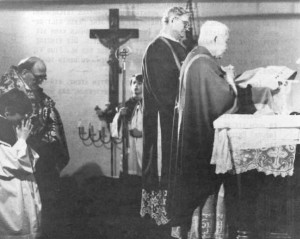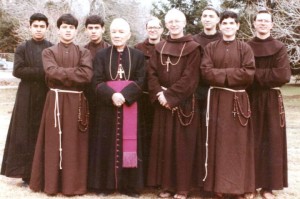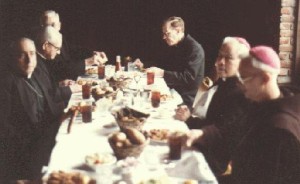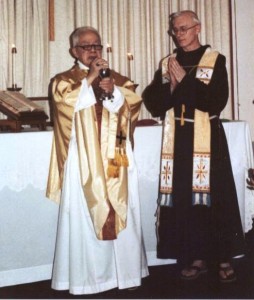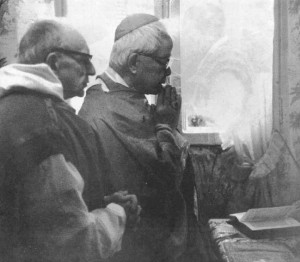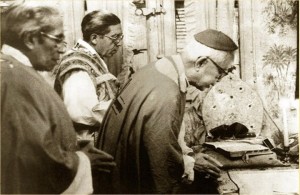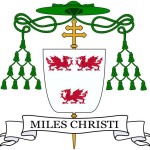A priest who lived with the archbishop as a seminarian in 1982–3 offers insights into the prelate’s personality and character.
By Rev. Anthony Cekada
IN A PREVIOUS post, I presented a video I had made on the validity of the episcopal consecration conferred by Archbishop Pierre-Martin Ngo-dinh-Thuc in 1981. The video deals mainly with various theological and factual issues I had researched, but in passing, I mention the testimony of Fr. Francis Miller OFM of Lafayette LA as to the piety, the virtue and the mental acuity of the archbishop when Fr. Francis was a seminarian and lived in the same house with him in 1982-3. This, I noted, was another nail in the coffin for the slanderous accusation that the good archbishop did not possess the requisite “mental state” to confer a sacrament validly.
The end of Abp. Thuc’s stay in Rochester came more than a year later when he was spirited off to New York City by Novus Ordo Vietnamese priests. He was eventually taken to a Vietnamese community in Carthage MO, where he died in 1984.
Last month, a priest in Europe wrote to Fr. Miller for details of his recollections. Father sent the priest a copy of a lengthy affidavit he had sworn to in late 2005 for a book on the Thuc consecrations. I have reproduced the text of the affidavit below, followed by some additional comments from Fr. Francis.
I highlighted a few particularly interesting passages. The account of the remark’s of the archbishop’s doctor about his complete competency are extremely significant. Even more interesting, Mgr. Thuc taught himself Spanish during his time at Rochester, so he could teach Latin in Spanish to the Mexican seminarians. Moreover, with the arrival of the archbishop, the friars instituted speaking conversational Latin for one day a week:
On that day the Archbishop’s voice would ring through the house. Latin was as easy for him as his mother language, Vietnamese. His fluency overwhelmed our untrained ears, and the days offered an opportunity for him to exercise and direct his students in their lessons.
I can assure readers that none of the clergy I know who have attacked Abp. Thuc could pull off either one of these feats. And if you doubt that, you might want to ask one of them!
For those who are truly objective and interested in the facts, Fr. Francis’ words should once and for all dispel their unreasonable prejudices against this devout and edifying prelate.
———————————
Affidavit of Francis Miller OFM
My name is Francis, a solemnly professed religious of the Order of Friars Minor, O.F.M.: Franciscans. My entrance into Religion was August of 1980, in Rochester, New York, at the Shrine of the Immaculate Heart of Mary, 3376 Mt. Read Blvd., Rochester NY 14616. I was ordained to the priesthood in 1985 by Bishop Louis Vezelis. Currently I dwell in Lafayette, LA and serve at the Church of Christ the King, where the traditional Mass, and faith, of the Roman Catholic Church is offered. I write this short testimonial to review my memories of Archbishop Peter Martin Ngo-dinh-Thuc, and to give a first-hand witness in order that others may know more of His Excellency.
About the middle of October, 1982, it was announced that Archbishop Ngo-dinh-Thuc would join our life in the Friary at Rochester, New York. Preparations were made to receive him, and an escort was sent to smooth the way for his coming. Upon his arrival, His Excellency joined immediately into the rhythm of our religious life and schedule: midnight Office, meditation and community meals. For every Divine Office he joined us in chapel. His Mass was offered where the public might and did attend. On Sundays he would occasionally offer Holy Mass both in Rochester and in Buffalo, New York at Sacred Heart Church. The year and almost four months that I knew and lived with His Excellency ran much like this.
Other Activities
His Excellency looked after all his personal needs by himself. These included care for needs of daily living such as bathing, dressing, etc. Often he would go into the yard and walk though the grass, sometimes with a seminarian, for fifteen to twenty minutes almost every day. Winter was more difficult as New York weather must be considered. The house staircases within the Friary, two of which he negotiated several times a day, were never a major barrier to him. But for the most part he walked unassisted outside of ice, stairs new to him or without a banister. He used no walker but we encouraged the cane, which he used sometimes. His posture was only a little stooped, his gait short and occasionally studied, especially on the stairs. This may be because he was not both limber and strong. However, his sense of duty gave him determination when he had an end in view with much to do physically. At Holy Mass he was willing to sing the Mass and did a beautiful job. There was as well as singing the Divine office with the community. I never knew the Archbishop to drive a car.
His Excellency desired to be useful and help as best he was able. His energy was not that of his youth, but it allowed him to offer himself in several ways. At that time, the house had seven seminarians in their first year of Latin. He taught them regularly in a classroom setting using Latin and Spanish to speak with them.
When an occasion arose for His Excellency and Bishop Louis to travel to Mexico I accompanied them as an aide. His Excellency was most insistent on greeting the parents of the seminarians whom he had instructed in Rochester. Small exchanges were made, which were tokens of respect and gratitude for their parental sacrifices for Holy Mother Church, and His Excellency delighted to have greeted these good families. He was able to speak with them, with his newly learned Spanish, of their sons. Acapulco, Guadalajara and Colima were the locations of these homes and travel between the last of these two cities is no small feat on such highways. This is an example of His Excellency’s determination of purpose of meeting with the family in Colima, Mexico.
It was very often the case that I would accompany His Excellency to the doctor’s office for his regular visits. He particularly enjoyed these visits, as the good doctor spoke excellent French. It was the doctor’s opinion that his health was good, except for some difficulties he had with sweets affecting the good Bishop’s blood sugar levels. This was the only concern of the good and respected Doctor. In all of my conversations the Doctor never was expressed concern for Archbishop’s mental condition. He stated, rather, that I need not worry at all, that His Excellency was quite competent. He holds this position to this day. To my knowledge the doctor, though a Catholic, has never regularly attended the Tridentine Mass.
The Holy Sacrifice of the Mass
Of all the memories of my life, among the sweetest and most edifying were to watch His Excellency offer Holy Mass. His observance of the rubrics was impeccable. His poise, prayerfulness and attention were keen. He truly prayed the Mass. Many times he required help to rise from a genuflection and for this reason the older cleric friars stood by his side to assist Him. Many times his example caused me to aspire to offer the Holy Sacrifice of the Mass as well as did the Archbishop. Anyone who attended His Mass could not miss his keen attention and devotion at the Altar. Here he was at his finest and edified us all.
Other Memories
On a winter’s day we walked to the chapel, a distance perhaps of 100 feet, over pavement. The ground was frozen, and the Archbishop lost his footing. Slipping, he fell upon his back. Immediately fear and shame came upon me for not taking better care of him for a broken hip could be too much for a man of his age. Rocking to an upright position he began to laugh Ça ne fait rien de tou. Un peu souffrance pour le purgatoire, which means “it does not matter at all. A little more suffering for purgatory.” While on the ground, he offered his hands, and we pulled him to his feet. We then went into the chapel for Prime, Holy Mass and meditation. He never complained of the incident.
Another often repeated saying of His Excellency was: Une petite croix pour le bon Dieu: A small cross (to offer to) for the good God.
To return for a moment to the Mexican seminarians, it was for their sake that he began to practice and perfect his Spanish. His mastery of languages permitted him to make quick progress with that language over the months he was in Rochester.
Among the young seminarians who joined the house that year, two Mexicans drew the Archbishop’s attention in particular. They were quick of mind, cordial and focused. Had he been able to patronize them, they might have enjoyed great favors, if I dare speculate. His encouragement and interest made a difference in their enthusiasm for the studies and work before them.
Among the practices taken up at the Friary with the coming of the Archbishop was the speaking of Latin, exclusively, one day a week. On that day the Archbishop’s voice would ring through the house. Latin was as easy for him as his mother language, Vietnamese. His fluency overwhelmed our untrained ears, and the days offered an opportunity for him to exercise and direct his students in their lessons. The Archbishop enjoyed these days, even though he saw us struggle in our Latin.
Overall Impressions
As a young man, I did not always understand His Excellency’s opinions and judgments. His wisdom often surprised and still surprises me even as I’ve grown older. The western mind must appreciate that he was of the mandarin culture and was certainly not egalitarian. From those who belonged to his household he expected reverence and obedience. He was careful to be charitable and fulfill the duties towards those who had a claim upon him, but, again in charity, he himself would not be a burden or overreach. He trusted others, and that was clearly a habit with him.
His Excellency was attentive to the world around him. He took interest in his students, their progress and their interest. His health was good, except for some the concern about sugar. His sense of humor was good, and he was long suffering. He was proud of his healthful appearance, but not absorbed by such things. He kept the religious schedule exactly, and his prayerful offering of the Holy Mass was a thing to be admired. In short, I never witnessed any loss of the faculties of reason and memory. Even in his interests in the world around him he was lucid. Above all, He loved Our Lord and Holy Mother Church and this was obvious to me and I believe to all who witnessed him in action.
Signed this December 7th and I declare it to be true to the best of my memory.
/s/ Fr. Francis Miller O.F.M.
Witnesses: /s/ Bruce Billeaud /s/ Miles Duthile [followed by attestation Donna M. Thibodeaux, Notary, Id # 23574]
——————————–
Subsequent Comment from Fr. Miller
This [affidavit] is straight from my files and contains what was used [in the book] I believe.
I would be glad to add a few points that have always weighed heavily and recently been brought to my attention again:
Archbishop Ngo was not one to speak to freely when needled (agitated by others). He generally would go silent and suffer abuse. Knowing him so well taught me to listen and wait for a better disposed moment to approach a subject. He knew what he was up to, clearly. Again, he had his favorites some may fault him for that — but this choice seemed based on the good will of the person, intelligence, and sometime generosity toward himself. He did go out of his way to make himself lovable to the youngest of the Mexican seminarians, 13 years old at that time, and that is generosity on his part. No one who ever was known to attend the Archbishop’s Mass ever accused him of not being attentive, devout and exact in his rubrics of the Mass. He is renowned for his beautiful Masses. Never did I see him defect in the Mass’s action, his only clear weakness being occasional difficulty in genuflecting at the altar, for which reason I stood beside him to steady and lift him throughout the moments of the Mass this might occur. In fact you will find many praise his rubrics and piety throughout his life.
With such experience as this if is impossible to concede that he did not know what he was about when conferring sacraments as I never witness reason to doubt the clarity of the mind. As a much older and experienced man that impression only grows stronger.
As His doctor told me over and over again on 3 separate (by over 20 years time) “only someone who never knew Archbishop Ngo would make such an accusation”.
Further, I heard in a debate between Bishop Donald Sanborn and Dr. Robert Fastiggi that a claim was made that the good archbishop reconciled before his death. This point I could not concede as:
- No signed document was ever brought forward, though they show [the archbishop] smiling in a picture, pen in hand suggesting he had done so.
- Among His last words to me as he was being abused in New York [City, where the Novus Ordo Vietnamese clergy had taken him — ed.] during the terrible events that lead to the loss of our shared household, he said: “They want me to sign a reconciliation and renounce all that I have done. [Laughing now, he continued:] Why would I do this? [Then very serious:] This would destroy the work God gave me to do of preserving the sacraments for the future. I cannot do that!“
- There is no written evidence to my knowledge that that last statement of a change of mind was ever given privately or publicly, only assertions have been offered.
- I know that he was very lonely, and wanted more companionship which he may have privately thought a change of residence may have brought. It may be that he, as I could tell that his mind was not clear in New York [City] due to the severe change of diet and reflected by lack of interest in doing anything but sleeping at that time, would have induced him to be silent and wait till a better time to act, to decide how to proceed. A time that never came for him, and he was never permitted [by the Novus Ordo clergy who had taken him away] to see me again, nor to see any of his sons in the Faith to my knowledge.
These last statements of mine have never been offered in the public forum, but Restoration Radio has asked for an interview and there would be a place to examine many other points perhaps.
Yours in Christ,
Fr. Francis Miller OFM
February 26, 2014
